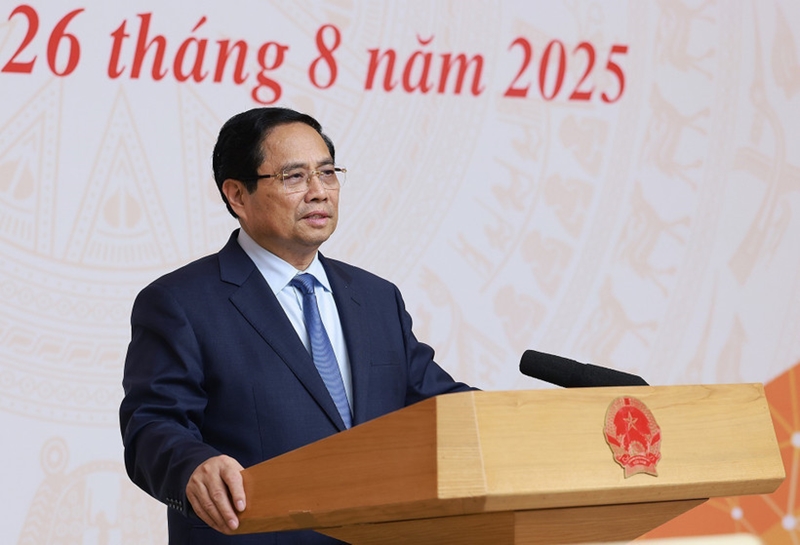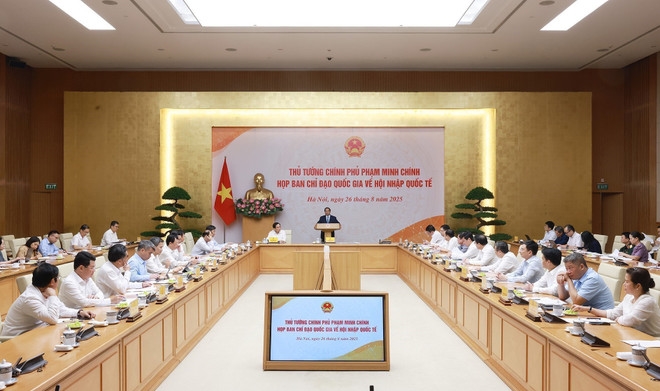In his remarks, the PM urged members of the Steering Committee to uphold the highest sense of responsibility in their roles, ensuring the committee meets the goals set out in the Party’s resolutions and the State’s policies on international integration. He commended the Ministry of Foreign Affairs for swiftly drafting the Government’s action program to implement the Politburo's Resolution 59 on international integration in the new context, and preparing a proposal for the National Assembly on special mechanisms and policies to accelerate its execution.
    |
 |
|
Prime Minister Pham Minh Chinh speaks at the conference. |
International integration has importantly contributed to strengthening a peaceful and stable environment for national development, especially amid the current global context of uncertainty, instability, and complexity, he said.
Since the adoption of Resolution 59, Vietnam has stepped up and upgraded its network of partners, deepened bilateral ties, expanded cooperation across sectors, and strengthened political trust and shared interests. The country has comprehensive partnership relations or higher with 38 countries, he added.
International integration has become a key driver for strengthening Vietnam’s internal capacity and supporting national development. Despite slowing global growth and rising uncertainties, Vietnam maintained strong performance with GDP expanding 7.52% in the first half of 2025. Export turnover in the first seven months exceeded 514 billion USD, while registered and disbursed FDI reached 24.1 billion USD and 13.6 billion USD respectively, placing the country among the world’s top 15 developing economies in FDI attraction.
International integration has also spurred institutional reforms, translating international commitments and agreements into practice while enhancing Vietnam’s role, voice, and position in the international arena. It has drawn increasingly active and proactive participation from ministries, agencies, and localities nationwide.
Building on achievements and recognizing challenges, the PM highlighted three lessons for future international integration - combining national strength with the strength of times, coordinating foreign affairs with other integration pillars, and prioritizing human development as key to success.
    |
 |
|
Prime Minister Pham Minh Chinh, head of the National Steering Committee on International Integration, chairs a conference in Hanoi on August 26 to launch the committee, review the international integration work. |
He called for the continued implementation of Resolution 59, especially its new approaches and strategies for international integration in the current context, and urged the swift completion of a N.A. resolution on special mechanisms and policies to support international integration.
The standing agencies of the inter-sectoral steering committees, including the Ministries of Foreign Affairs, Industry and Trade, and Home Affairs, were tasked with promptly coordinating with members of the National Steering Committee on International Integration to develop specific work plans within their respective areas.
The PM stressed accelerating preparations for key international integration activities this year, including the U.N. Cybercrime Convention signing in Hanoi, finalizing APEC 2027’s organizational structure, and ensuring Vietnam’s leaders participate successfully in major year-end multilateral events such as the U.N. General Assembly, ASEAN Summit, APEC, and G20.
He called for stronger implementation of commitments and agreements signed during high-level diplomatic activities.
The PM called for stronger oversight of international commitments made during high-level diplomatic activities, urging ministries, agencies, and localities to actively implement them while proactively identifying and resolving obstacles to ensure effective execution.
The Government leader expressed his belief that ministries, agencies, localities, and the Steering Committee’s members will overcome challenges, making international integration a responsibility of the entire political system, in line with Resolution 59’s consistent principle that international integration is the cause of entire people.
Source: VNA